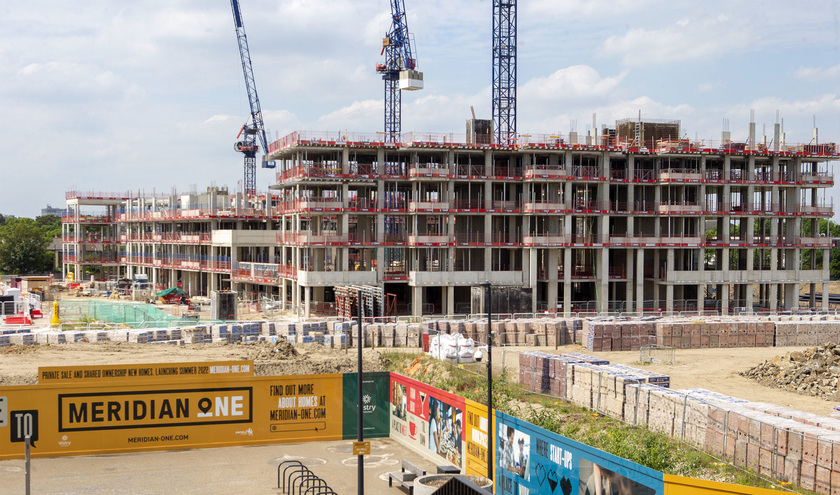Enfield, like many boroughs across London, is at a critical juncture. It stands at the forefront of the housing crisis and on the cusp of a surge in regeneration which could change the face of local authority led housing and regeneration.
Firstly, let's look at the current landscape; skyrocketing prices have left many residents struggling to find affordable homes, forcing some to relocate to more affordable parts of the country. The exodus of landlords from the rental market – whether to pursue higher rents elsewhere or exit renting altogether – has only exacerbated this issue.
This ongoing reduction in the availability of rental properties, particularly at the lower end of the market where rents align with Local Housing Allowance rates, is having a profound impact on local families and the borough's economic vitality. The dwindling supply of affordable housing threatens to disrupt family life and poses challenges to the borough's growth.
Despite these challenges, Enfield LBC is well-positioned to address the severe shortage of genuinely affordable social housing. The borough's vision and ambition for growth align with the new Government's agenda for a decade of renewal, presenting an opportunity to be a significant contributor to London's housing supply. Regeneration is key to this strategy, but it must be approached in a way that accelerates delivery while ensuring the benefits are shared with the existing community.
The council has taken decisive steps toward this goal, becoming the first borough to submit its Regulation 19 Local Plan for examination following the national election. This plan includes proposals for significant ‘grey belt' releases, notably at Crews Hill, a new settlement in the north of the borough, which has the potential to accommodate approximately 6,000+ new homes.
This development envisions a sustainable New Town or urban extension for London, strategically located by a train station with direct links to Moorgate in the City of London and near the M25. The site is primed for family housing and, by applying the New Towns criteria, could deliver up to 40% social rent homes – amounting to 2,400 homes – or even 50% if green belt policies are adopted. With some of the land already under council ownership, this site presents a prime opportunity for direct council house building, complemented by partnerships with selected housing associations from Enfield's Registered Provider framework.
The investment of time and resources by councils in developing Local Plans is significant, particularly in an era where local government funding is increasingly misaligned with need. However, for boroughs like Enfield that make this investment, the rewards are substantial. We are well-placed to collaborate at both national and regional levels, driving forward solutions that can deliver results early in the new parliamentary term.
Enfield is already making headway with major regeneration projects. The Joyce and Snell's Park estate regeneration in Angel Edmonton, for example, will deliver more than 2,000 new homes, with 53% designated as affordable. This project is not just about replacing life-expired housing; it's about enhancing safety, designing out crime, and creating high-quality public green spaces for the community and sharing a vision for the public realm with local people.
The affordable housing component will be delivered by the council, with future phases open to partnership delivery, offering a mix of tenures that reflect the needs of the community. Located near Silver Street station, with direct links to Liverpool Street and connections via Seven Sisters, this area is set to become even more attractive, contributing to the vibrancy of the local high street.
Further south, the council's long-term regeneration scheme at Meridian Water is another flagship project. It is supported by the council's district heating company, Energetik, which is providing the vital infrastructure for low carbon and secure heating and can be a wider solution in North London, and bolstered by more than £200m in infrastructure investments. Meridian Water has the capacity to deliver 10,000 homes; the first homes, which have already been delivered, are council-owned and prioritized for existing residents within the wider Edmonton community.
The investment in infrastructure alone is a huge feat for the council which has ultimate control of the direction of Meridian Water. These works include the construction of new roads, four bridges, footpaths, cycle links, transport improvements and two new parks, demonstrating the council's commitment to creating inclusive, cleaner and greener spaces.
Alongside this, Energetik is providing low carbon infrastructure that supports the borough's regeneration ambitions, creating a positive environment to attract new business to Enfield, investing locally and preparing for the area's future energy needs and bolstered by high-quality industry standards.
While Enfield LBC, backed by bold political leadership, is the driving force behind these ambitious projects, the council recognises that collaboration is key. Long-standing partnerships with developers are already yielding positive results in areas such as Ponders End and New Avenue at Oakwood. These high-quality developments are not only meeting new building safety requirements but also maximizing the delivery of affordable housing with the council's support.
Looking ahead, the alignment of Enfield's vision with the Government's new planning framework – particularly the measures to ensure land prices are ‘reasonable and proportionate' – alongside continued support from the Greater London Authority, will be crucial. Additionally, government measures to strengthen the resilience of Housing Revenue Accounts, which have been undermined since 2016, will ensure that development can continue, even as the council navigates the challenges and costs associated with increased regulation in social housing.
By renewing its ageing housing stock to make it warmer and greener, Enfield is laying the foundation for a sustainable future that benefits current and future generations.
Enfield's regeneration projects are not just about building much needed homes and securing a long-term pipeline of social housing; they are about creating vibrant, sustainable communities where residents can thrive. Through strategic planning, bold leadership, and strong partnerships, Enfield is setting a new standard for regeneration in London.
Joanne Drew is strategic director of housing and regeneration at Enfield LBC


